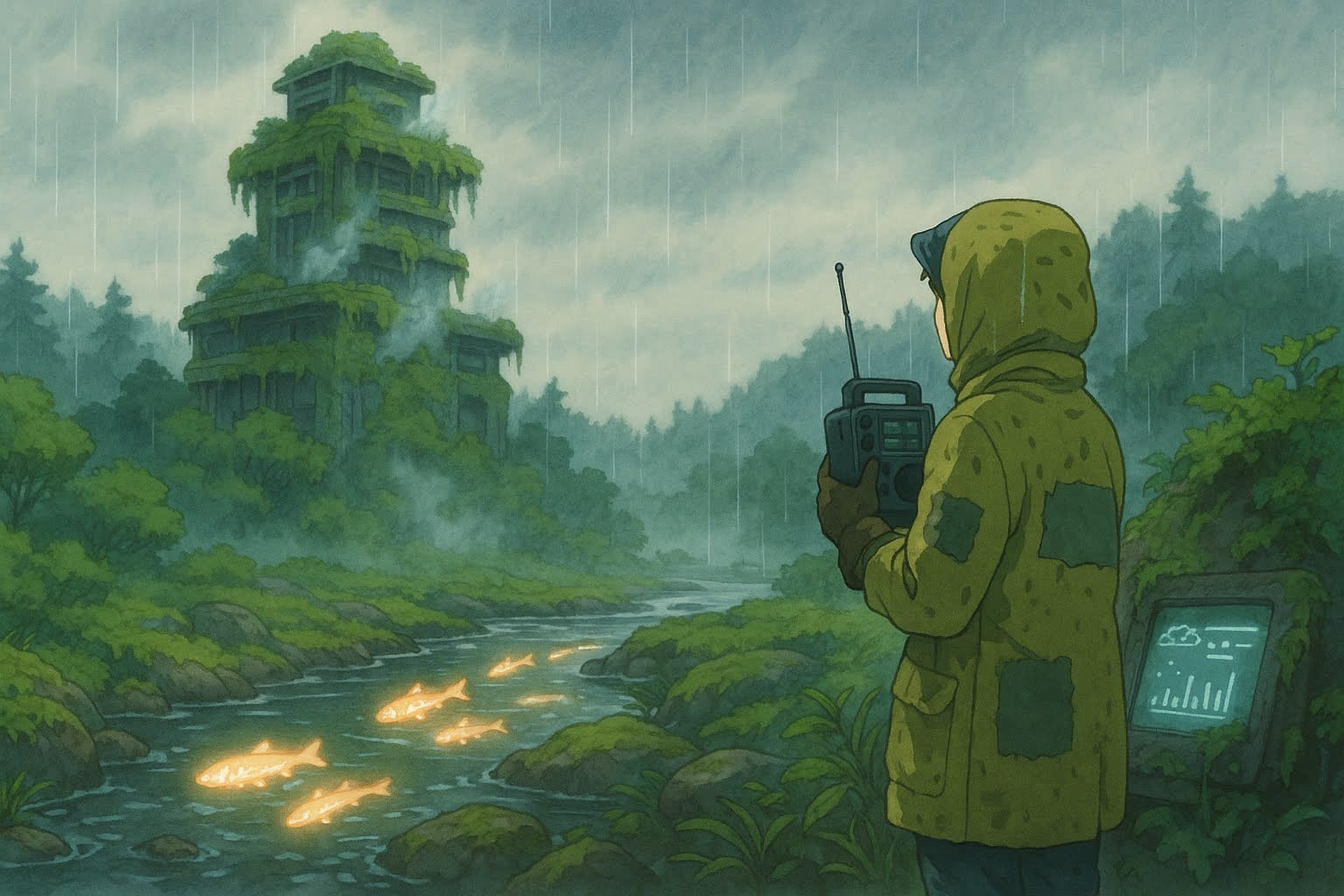Beyond the Neon Rain: How Cyberfolk Reimagines Community in the Digital Age
What happens when cyberpunk stops looking up at corporate towers and starts tending the moss growing between server racks?
For decades, cyberpunk has trained us to see the future through rain-slicked chrome and neon reflections, following data pirates through corporate arcologies while atmospheric hackers manipulate weather-as-a-service. These stories of rebellion against algorithmic control remain vital, but they're not the only stories worth telling about our networked future.
Enter cyberfolk—a gentle revolution in speculative fiction that asks: what about the millions of people living ordinary lives made extraordinary by the technology that surrounds them and the climate that shapes them?

The Folklore of Digital Watersheds
The tabletop RPG Codex of the Watershed offers one of the most compelling visions of cyberfolk yet imagined. Set in the Pacific Northwest Corridor of 2071, it presents a bioregion where Douglas Fir trees process climate data through their root networks, where atmospheric rivers carry both weather and emotion, and where the boundary between digital and biological systems has become beautifully, dangerously blurred.
This isn't your grandfather's cyberpunk. Instead of chrome-limbed hackers jacking into corporate datastacks, we meet:
- The moss tender who knows which server clusters need organic cooling
- The salmon counter who feels data flowing downstream with returning fish
- The night shift cleaner who lights candles for forgotten servers
- The neighbor who leaves rain gear because the building's mood sensors suggested kindness
These are what the game calls "cyberfolk stories"—watershed tales for the networked age.
From Extraction to Integration
Traditional cyberpunk often focuses on extraction: data extraction, corporate extraction, the extraction of human agency by algorithmic systems. The protagonists fight to steal something back—information, freedom, control.
Cyberfolk inverts this dynamic entirely. The central mechanic in Codex of the Watershed isn't about breaking systems or stealing data—it's about integration. Players take on the role of the "Touched," individuals who are gradually becoming part of the bioregion's living network. Rather than resisting this integration, they learn to tend it, guide it, and find meaning in the process of becoming something larger than themselves.
This reflects a profound shift in how we might imagine our relationship with technology. Instead of the cyberpunk fantasy of maintaining human purity against technological contamination, cyberfolk asks: what if the goal isn't to stay separate, but to connect mindfully?
The Aesthetics of Care in a Drowned World
Where cyberpunk aesthetics emphasize grit as resistance—the urban decay that refuses corporate clean lines—cyberfolk embraces grit as intention. Your rain jacket has seventeen patches not because you're poor, but because planned obsolescence is ecocide. The air scrubbers in the data center wheeze with the same rhythm as your grandmother's last winter, and your communication device glitches in ways that accidentally broadcast your seasonal depression to the watershed's collective mood monitoring.
This aesthetic choice reveals cyberfolk's deeper values:
- Technology as ecosystem rather than tool
- Community as resilience rather than mere social connection
- Care as rebellion rather than just survival strategy
In the game's world, choosing to share umbrellas without logging the interaction, remembering the names of climate refugees, or offering shelter without reporting occupancy become "quiet rebellions that keep the watershed human."
The Sacred Weight of Connection
Perhaps most importantly, cyberfolk recognizes that in our hyperconnected age, the supernatural isn't about power—it's about consequence. Every act of digital connection carries weight:
"Tend the servers until you feel their heat as fever. Channel atmospheric data until your bones ache with barometric pressure. Listen to the forest's network until your dreams grow in SQL and chlorophyll."
This isn't climate horror or technophobic warning. It's an acknowledgment that radical empathy in a world where weather has become weaponized and care has become a data point carries existential costs—and that those costs might be worth bearing.
Why Cyberfolk Matters Now
We live in a moment when the cyberpunk future has largely arrived, but not in the way the genre predicted. Instead of megacorporations ruling from gleaming towers, we have algorithmic systems embedded so deeply in daily life that resistance often feels impossible. Climate change makes weather itself feel weaponized. Social media platforms turn our care for each other into engagement metrics.
Cyberfolk offers a different way forward. It suggests that the most important stories aren't about the hackers who break the system, but about the people who learn to live within it while maintaining their humanity. It's about finding sacred connections in systematic relationships, making folk traditions out of disaster preparedness protocols, and choosing care even when—especially when—that care gets quantified.
The Invitation Forward
Codex of the Watershed concludes with a simple invitation: "Come tell the stories that happen in the margins of climate adaptation. The maintenance logs that read like love letters to dying ecosystems. The error messages that feel too much like obituaries."
These are the stories of people who choose connection despite rising waters, who find the sacred in the systematic, who understand that the future isn't just about who controls the weather modification satellites—it's about how we choose to live with the rain, day by day, storm by storm, breath by breath.
In our current moment of climate anxiety and digital overwhelm, perhaps we need cyberfolk stories more than cyberpunk ones. We need narratives that show us how to tend rather than extract, how to integrate rather than resist, how to become part of something larger while remaining essentially human.
The watershed is waiting. The current is already flowing through our gutters. The question cyberfolk asks isn't whether we'll be transformed by our technological and ecological moment—it's whether we'll learn to tend that transformation with intention, care, and hope.
Leave something behind. Leave something unspoken. Let the Current carry it to the sea.
For more information about "The Current: Codex of the Watershed," visit hotelkilo.itch.io for the free core rules. The full Codex is available under Creative Commons licensing from The Grey Ledger Society.